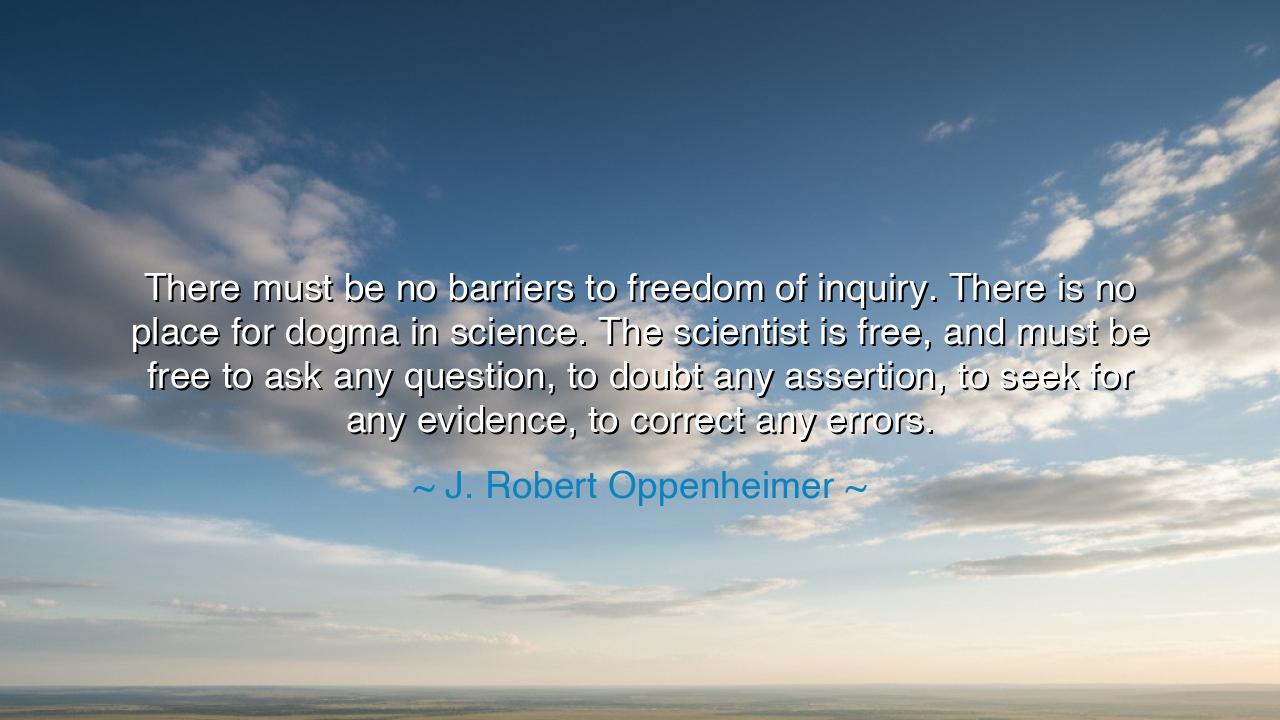
There must be no barriers to freedom of inquiry. There is no
There must be no barriers to freedom of inquiry. There is no place for dogma in science. The scientist is free, and must be free to ask any question, to doubt any assertion, to seek for any evidence, to correct any errors.






Host: The room feels still, the soft glow of the lamp casting a warm, inviting light across the space. Outside, the world is quiet, and the evening seems to draw in, creating the perfect atmosphere for a conversation about knowledge, freedom, and the pursuit of truth. Jeeny sits on the couch, her legs tucked beneath her, a cup of tea resting in her hands. Jack, standing by the window, gazes out at the darkened world outside, clearly lost in thought.
Jeeny: “Jack, I came across a quote from J. Robert Oppenheimer today that really made me reflect on the nature of science and inquiry,” she says softly. “He said, ‘There must be no barriers to freedom of inquiry. There is no place for dogma in science. The scientist is free, and must be free to ask any question, to doubt any assertion, to seek for any evidence, to correct any errors.’ What do you think about that?”
Jack: He turns to face her, a thoughtful expression crossing his face. “That’s a powerful quote. Oppenheimer is essentially saying that the heart of science is about questioning, doubting, and correcting — in other words, the freedom to explore without limits or preconceived notions. For science to progress, there must be no dogma or rigid thinking that limits the pursuit of knowledge. Truth can only be uncovered through questioning, testing, and revising ideas based on evidence.”
Jeeny: “Exactly. It’s about freedom in the truest sense — the freedom to challenge the status quo, to reject accepted ideas if the evidence doesn’t support them, and to remain open to new possibilities. Dogma has no place in science because it prevents progress. Science relies on the idea that our understanding of the world is constantly evolving, and we must remain open to changing our beliefs when new evidence or insights emerge.”
Host: The light in the room seems to soften, as though their conversation is uncovering something deeper about the role of freedom in intellectual and scientific exploration. Jeeny speaks with an understanding that science is not just a pursuit of knowledge, but a commitment to freedom of thought, inquiry, and the courage to question what is accepted as truth. Jack stands still for a moment, reflecting on how dogma can constrain not only science, but any field of inquiry or personal growth.
Jack: “What’s so compelling about Oppenheimer’s perspective is that it challenges the idea that science is about having the right answers. It’s not about reaching a fixed conclusion or clinging to a set of beliefs. Science is about constantly being in pursuit of truth, even if that means admitting we don’t have all the answers yet. The freedom to ask any question and to doubt any assertion is what drives scientific discovery forward.”
Jeeny: “Yes, and that freedom is essential. If scientists are limited by dogma or restricted in what they can ask or explore, they are cut off from the very process that leads to breakthroughs. Science thrives when it’s free to ask bold, uncomfortable questions. It’s about the willingness to embrace uncertainty, to let go of what we think we know, and to keep searching for a deeper understanding. The most profound discoveries often come from those who dare to ask what others aren’t willing to.”
Host: The conversation deepens, as they reflect on how the freedom to question and doubt is the cornerstone of all intellectual progress. Jeeny and Jack both agree that Oppenheimer’s words go beyond science — they speak to the very nature of how we approach learning, knowledge, and truth. J. Robert Oppenheimer reminds them that the essence of discovery lies not in dogma, but in the freedom to seek, question, and correct.
Jack: “It makes me think about how important it is for society to protect this freedom — not just for scientists, but for anyone seeking truth. If we restrict questioning or limit certain ideas, we stifle innovation and progress. The freedom to explore the unknown is what drives humanity forward, whether it’s in science, art, or philosophy.”
Jeeny: “Exactly. And that freedom is what makes science — and knowledge in general — so dynamic. It’s always evolving, always questioning itself. No idea is ever above scrutiny. And that’s a powerful thing. If we could apply that same freedom of inquiry in all aspects of our lives, we might find ourselves more open-minded, more adaptable, and more ready to grow.”
Host: The room feels quieter now, as if the weight of their conversation has settled into something deeper. Jeeny and Jack sit together, reflecting on how freedom, curiosity, and the willingness to challenge ideas are at the heart of progress, discovery, and understanding. J. Robert Oppenheimer’s words remind them that true intellectual freedom lies in the ability to ask questions without fear of judgment, to remain open to change, and to continually seek knowledge — for it is in this freedom that we find the path to deeper truth.






AAdministratorAdministrator
Welcome, honored guests. Please leave a comment, we will respond soon